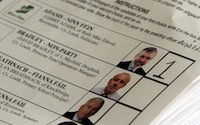
Sinn Fein is set to be a major player in 26 County politics after it more than tripled its seats in the Dublin parliament.
It secured 14 seats -- a massive gain from the total of four TDs following the party’s 2007 campaign.
Analysts are saying that, between a devastated Fianna Fail on one hand and a varied collection of independents on the other, it will take on the role of the main opposition party.
Party president Gerry Adams topped the poll in Louth with 15,072 votes, more than doubling his party’s vote and defying a large number of establishment figures who had predicted his demise.
Addressing his supporters at the count centre in Dundalk, he said: “It’s your victory, it’s a victory for the republican people of Co Louth.”
He added: “We went out with a very, very clear manifesto in terms of core, genuine republican values which are about upholding citizenship, looking after the most vulnerable, making sure that people have their entitlements.
“That’s what we’re about. We’re also a united Ireland party. We’re an all-Ireland party.”
And he remarked that his victory came close to the 30th anniversary of the start of the 1981 hunger strike, in which ten men died for recognition as political prisoners.
“Next Tuesday is the day that Bobby Sands started his hunger strike. Okay, so this isn’t just about who wins what and who tops the poll and who doesn’t, this is about actual sacrifice in terms of ongoing reconquest of Ireland by the people of Ireland.”
Outgoing Louth deputy Arthur Morgan said he was impressed by how well Mr Adams polled.
“I was a bit surprised but in the last 10 days of campaigning there has been a palpable buzz. I felt people were going out of their way to shake his hand,” he said.
It all translated into Sinn Fein having 1,208 first-preference votes more than the quota and 1,092 votes more than Fine Gael’s Fergus O’Dowd. Adams exceeded the quota and was elected on the first count.
But the party had already kicked off in Donegal, where Pearse Doherty repeated his by-election triumph with one of the highest personal votes of the election.
After he topped the poll inDonegal South West, and news came through of a similar success in Donegal North East, he said: “You’ve heard about ‘greening the west’ - well we’ve taken that to the Atlantic.”
He was referring to Sinn Fein’s Westminster representation in the Six Counties -- traditionally dark green in political maps -- once colouring the west of the River Bann in the Six Counties and now extending across the border and all through Donegal.
The colour has now extended around the country, firstly in Dublin -- where Sinn Fein increased its representation from one to four -- and then from Munster through Connaught and back to Leinster.
Decades of political work paid off for Sinn Fein in Cork, with two surprise victories in Cork city and county.
The plan of fielding a Leitrim candidate also brought home a seat in Sligo/North Leitrim, so that all of the border counties -- on both sides of the border -- have now turned green.
The ‘fifth province’ of Meath was not left out either, and the celebrations concluded with the sounds of Shinners singing ‘A Nation Once Again’ in Fianna Fail’s former ‘jewel in the crown’, the constituency of Laois/Offaly.
Mr Adams was this week preparing his party to provide strong opposition in the Dail. He described dealing with his political opponents in the election campaign, which say a personal smear campaign directed against him, as “like dealing with the DUP of 20 years ago.”
He already criticised Fine Gael’s plans for government, describing them as “swingeing, anti-citizen, economically illiterate measures”.
His party would now sit down to discuss its strategy in the new parliament and its position within the Opposition, he said.
Asked about Labour’s plan to enter a coalition government with Fine Gael, he said: “It appears to me that this is going to be a new government implementing old policies, Fine Gael and Labour implementing Fianna Fail policies, and that won’t do.”
![[Irish Republican News]](https://republican-news.org/graphics/title_gifs/rn.gif)
![[Irish Republican News]](https://republican-news.org/graphics/title_gifs/harp.gif)

